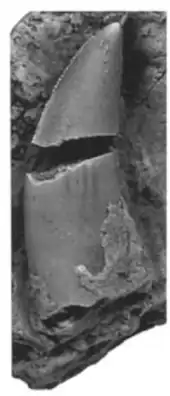Avalonianus
Avalonianus is a highly dubious and possibly invalid genus of archosaur from the Late Triassic of England. It was first described in 1898 by Harry Seeley with the name Avalonia,[1] but that name was preoccupied (Walcott, 1889), so Oskar Kuhn renamed it in 1961, albeit with no epithet (although Seeley added the epithet sanfordi in 1898[1]). It was thought to be a prosauropod, but later analysis revealed it was actually a chimera,[2] with the original teeth coming from a non-dinosaurian ornithosuchian (or possibly an early theropod), and later-referred post-cranial prosauropod remains (which were renamed Camelotia).[3] The only sufficient remains attributable to Avalonianus are several now lost fossil teeth from the chimera that were referred to Archosauria.
| Avalonianus Temporal range: Late Triassic, | |
|---|---|
| Scientific classification | |
| Domain: | Eukaryota |
| Kingdom: | Animalia |
| Phylum: | Chordata |
| Class: | Reptilia |
| Clade: | Archosauria |
| Genus: | †Avalonianus Kuhn, 1961 |
| Species: | †A. sanfordi |
| Binomial name | |
| †Avalonianus sanfordi Seeley, 1898 | |
| Synonyms | |
| |

References
- H. G. Seeley. 1898. On large terrestrial saurians from the Rhaetic Beds of Wedmore Hill, described as Avalonia sanfordi and Picrodon herveyi. Geological Magazine, decade 4 5:1-6
- P. M. Galton. 1998. Saurischian dinosaurs from the Upper Triassic of England: Camelotia (Prosauropoda, Melanorosauridae) and Avalonianus (Theropoda, ?Carnosauria). Palaeontographica Abteilung A 250(4-6):155-172
- Go to Camelotia for more information